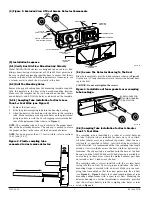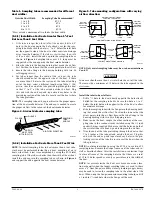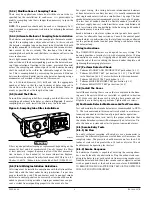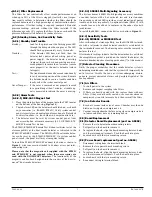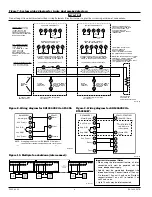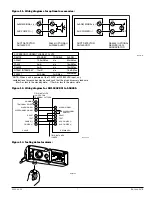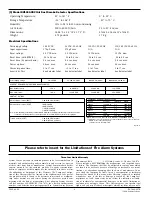
Table 1. Sampling tubes recommended for different
duct widths:
Outside Duct Width
Sampling Tube Recommended*
1 to 2 ft.
ST-1.5
2 to 4 ft.
ST-3
4 to 8 ft.
ST-5
8 to 12 ft.
ST-10
*Must extend a minimum of two-thirds the duct width.
[5.4.1] Installation For Ducts Greater Than 1
1
⁄
2
Feet
But Less Than 8 Feet Wide
1.
If the tube is longer than the width of the air duct
, drill a 3⁄4”
hole in the duct opposite the hole already cut for the sam-
pling tube. Make sure the hole is 1” to 2” below the inlet hole
on the opposite side of the duct to allow moisture drainage
away from the detector.
If the tube is shorter than the width
of the air duct
, install the end cap into the sampling tube as
shown in
Figure 4
. Sampling tubes over 3 ft. long must be
supported at the end opposite the duct smoke detector.
2. Slide the tube into the housing bushing that meets the air flow
first. Position the tube so that the arrows point into the air flow.
3. Secure the tube flange to the housing bushing with two #6
self-tapping screws.
4. For tubes longer than the width of the air duct, the tube
should extend out of the opposite side of the duct. If there
are more than 2 holes in the section of the tube extending
out of the duct, select a different length using Table 1. Oth-
erwise, trim the end of the tube protruding through the duct
so that 1” to 2” of the tube extend outside the duct. Plug
this end with the end cap and tape closed any holes in the
protruding section of the tube. Be sure to seal the duct where
the tube protrudes.
NOTE:
The sampling tube end cap is critical to the proper opera-
tion of the duct smoke detector. The end cap is needed to create
the proper air flow to the sensor of the duct smoke detector.
Figure 4. Air duct detector sampling tube:
SAMPLING
TUBE
END CAP
AIR HOLES
ARROW
MUST FACE
INTO AIR FLOW
AIR FLOW DIRECTION
FLANGE
H0108-02
[5.4.2] Installation For Ducts More Than 8 Feet Wide
NOTE:
To install sampling tubes in ducts more than 8 feet wide,
work must be performed inside the air duct. Sampling of air in
ducts wider than 8 feet is accomplished by using the ST-10 inlet
sampling tube. If the tube is shorter than the width of the air duct,
install the end cap into the sampling tube as shown in
Figure 4
and support the end opposite the duct smoke detector.
Figure 5. Tube mounting configurations with varying
air flow direction:
AIR FLOW
DIRECTION
DETECTOR
HOUSING
DOTS INDICATE POSITION OF
SAMPLING TUBE HOLES
AIR FLOW
DIRECTION
DETECTOR
HOUSING
SAMPLING
TUBE
EXHAUST
TUBE
AIR FLOW
DIRECTION
EXHAUST
TUBE
SAMPLING
TUBE
SAMPLING
TUBE
EXHAUST
TUBE
DETECTOR
HOUSING
AIR FLOW
DIRECTION
DETECTOR
HOUSING
A.
B.
C.
D.
HORIZONTAL MOUNTING OF HOUSING
VERTICAL MOUNTING OF HOUSING
NOTE: Only metal sampling tubes may be used on orientations
C and D.
WARNING
In no case should more than 2 air inlet holes be cut off the tube.
There must be a minimum of 10 holes in the tube exposed to the
air stream.
Install the inlet tube as follows:
1. Drill a
3
⁄
4
˝ hole in the duct directly opposite the hole already
drilled for the sampling tube. Make sure the hole is 1 to 2”
below the inlet hole on the opposite side of the duct to allow
for moisture drainage.
2. Slide the sampling tube with the flange into the housing bush-
ing that meets the air flow first. Position the tube so that the
arrow points into the air flow. Secure the tube flange to the
housing bushing with two #6 self-tapping screws.
3. From inside the duct, couple the other sections of the sam-
pling tube to the section already installed using the 1⁄2 inch
conduit fittings supplied. Make sure that the holes on both of
the air inlet tubes are lined up and facing into the air flow.
4. Trim the end of the tube protruding through the duct so that
1 to 2 inches of the tube extend outside the duct. Plug this
end with the end cap and tape closed any holes in the pro-
truding section of the tube. Be sure to seal the duct when the
tube protrudes.
NOTE:
An alternate method to using the ST-10 is to use two ST-5
sampling tubes. Remove the flange from one of the tubes and in-
stall as described above. After the installation, use electrical tape
to close off some of the sampling holes so that there are a total
of 10 to 12 holes spaced as evenly as possible across the width of
the duct.
NOTE:
Air currents inside the duct may cause excessive vibra-
tion, especially when the longer sampling tubes are used. In these
cases a 3” floor flange (available at most plumbing supply stores)
may be used to fasten the sampling tube to the other side of the
duct. When using the flange/connector mounting technique, drill
a 1 inch to 1
1
⁄
4
inch hole where the flange will be used.
D100-68-00
3
I56-1684-007R
H0109-01


